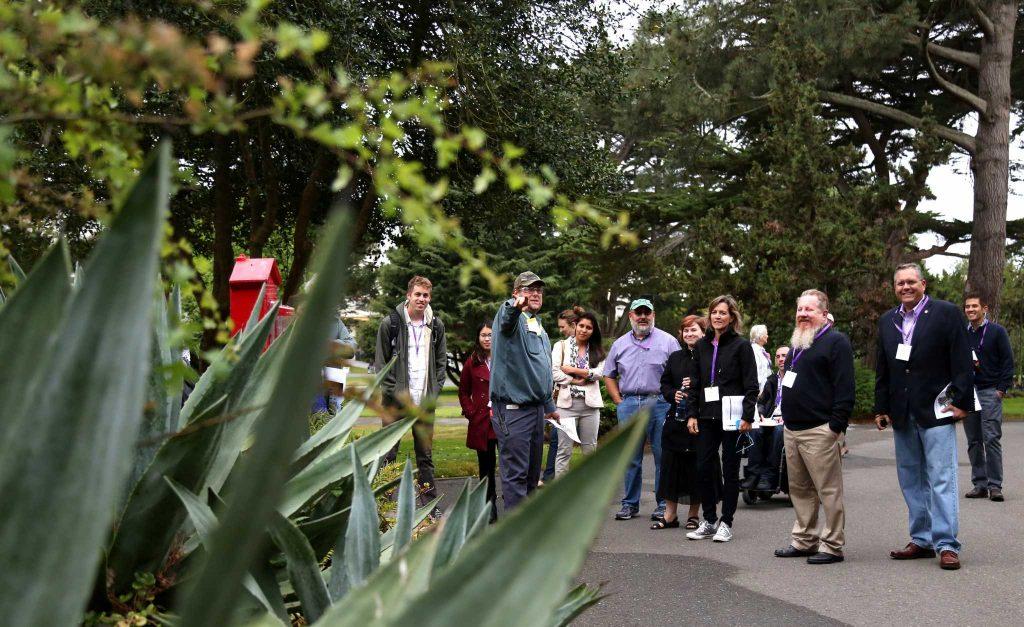[slideshow_deploy id=’66862′]
The largest-ever California Higher Education Sustainability Conference emphasized the urgent need for sustainability on college campuses July 20-24 at SF State.
This year was the first time SF State hosted CHESC, with attendance being the highest in the conference’s 13-year history, according to Katie Maynard, the conference manager and University of California, Santa Barbara’s sustainability coordinator. Maynard said the record turnout, which included 1,222 registered attendees, 95 volunteers and 313 presenters, was in part due to the scholarships provided to schools with smaller budgets.
SF State students, faculty and staff led panels on topics pulled from student-proposed initiatives, institutionalized sustainability practices and new technology implemented on campus.
SF State’s Sustainability Coordinator Nick Kordesch said that this year’s conference theme, “Can we change fast enough?” highlighted the urgency of making college campuses greener.
“Everyone there is focused on sustainability and improving the way we interact with our environment and our impact on the environment, but we’re already at a point where there are going to be impacts on the climate no matter what we do going forward,” Kordesch said. “So the question is, how do we deal with that, and what role does sustainability play?”
Cain Buckler, the student sustainability coordinator at SF State, presented his campus de-lamping project July 22. De-lamping is an ongoing project in which Buckler and others remove light bulbs from a portion of the stairwells at school, many of which, according to Buckler, are over-lit.
“The cool thing about the project is, I didn’t actually come up with any of it,” Buckler said. “It came from a class. I worked with facilities, and we made this idea that a student had happen on campus.”
So far the group has completed three buildings. They are currently working on Burk Hall and will soon start work on the Humanities building, Buckler said.
Linda Morton, a gardening specialist with the University Park Management Grounds Department, detailed SF State’s plan to install 21 computer-operated irrigation controllers during a tour of SF State’s landscaping. The new CalSense smart controllers are linked to a weather satellite and are capable of detecting and deactivating problems like burst pipes and broken sprinkler heads.
Two controllers have been installed so far; one at University Park South and the other at University Park North. Morton said she and her team also installed new turf that uses 30 percent less water than the old turf and only requires mowing once or twice a year, reducing green house gas emissions.
“Lawns that aren’t used for recreation will be removed … and replaced with plants that flower,” Morton said. “The plants that we’ll use will be a mix of Mediterranean plants— so plants from California, plants from South Africa, plants from New Zealand, plants from South America. All the climates that have similar climates to ours.”
The new systems use an underground irrigation method rather than an above ground sprinkler, allowing water to go directly to the roots and reducing evaporation, Morton said. Although the new systems will initially cost $143,000, she said she expects them to cut water use by 45 percent and hopes the project will be completed by early 2016. Maintenance staff will use the data collected by the controllers to reduce watering to the minimum needed for each area, she said.
Presidents from SF State, Humboldt State, Chico State, De Anza Community College and Pitzer College discussed their respective schools’ divestment from fossil fuel during a panel.
Divestment is the process of reducing or eliminating investments from a stock portfolio. Universities invest their endowments to fund programs for students and ensure continued growth of the university itself. In recent years, environmental groups like Fossil Free have made it their goal to urge universities to divest from fossil fuel companies due to their harmful effect on the environment.
SF State became the first public university on the West Coast to divest from fossil-fuel-related investments in 2013 when the school pledged to divest $2.5 million of its endowment that was invested in fossil fuels, according to a 2013 Xpress article.
During the panel, SF State President Leslie E. Wong said it was his students who first approached him about fossil fuel divestment. Wong said he was confident his students and faculty would continue to lead the way in sustainability.
“(Fuel divestment’s) not really the end of the story, and it might be the beginning that leads to greater things down the road,” Wong said.








